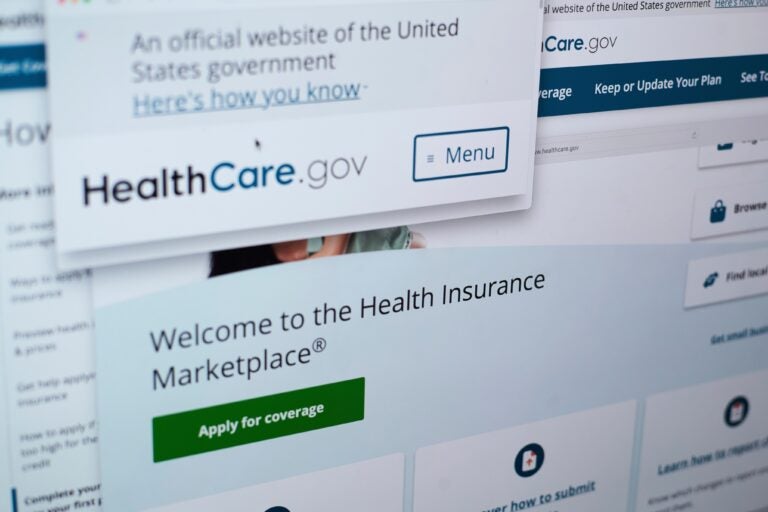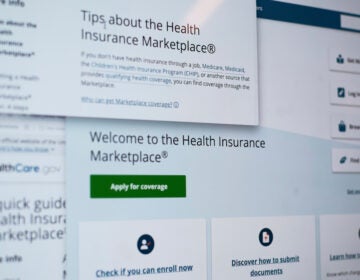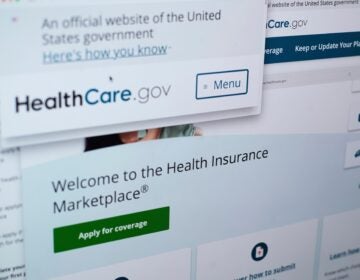Pa. prepares for more costly Nov. 1 ACA open enrollment as deadline looms to extend federal health subsidies
Congress remains deadlocked over extending federal health insurance subsidies and Pennsylvania makes contingency plans for disruption in the marketplace later.

FILE - Pages from the U.S. Affordable Care Act health insurance website healthcare.gov are seen on a computer screen, Aug. 19, 2025. (AP Photo/Patrick Sison, File)
From Philly and the Pa. suburbs to South Jersey and Delaware, what would you like WHYY News to cover? Let us know!
The window is closing for Affordable Care Act customers to see any last-minute federal health insurance subsidies come through before the start of open enrollment, which begins Saturday, Nov. 1.
It means that nearly 500,000 people in Pennsylvania who buy plans on Pennie, the state’s ACA marketplace, will need to shop for coverage that will cost them, on average, double what they paid last year.
If Congress extends enhanced premium tax credits and ends the government shutdown after open enrollment has already begun, Pennsylvania insurance experts are expecting to see mass disruption and confusion as the changes take place.
“If Congress passes something, we will need time to update the system, we will need time to update everyone’s costs,” said Devon Trolley, executive director at Pennie. “That is going to be very messy. We essentially have to tell people, ‘What we told you before is now wrong, just stick with us, hold on, we’ll be back in touch with your actual amount.’ That’s a really stressful situation to put people in.”
Important open enrollment deadlines and the status of tax credits
Pennie open enrollment begins Nov. 1. That’s when small business owners and people who don’t get health insurance from an employer can shop for plans and make changes to coverage for 2026.
About 9 in 10 Pennie customers have qualified for some form of financial subsidy that helps lower their monthly premium payments. Tax credits are calculated based on income and ensure that only a certain percentage of a person’s income goes toward premium costs.
In 2021, Congress passed additional or “enhanced” tax credits that lowered those premiums even more and expanded eligibility, making insurance affordable for more people. But those additional subsidies expire at the end of 2025 if Congress does not extend them.
The tax credits have become a sticking point between Democrats and Republicans in debates over reopening the federal government.
When Pennsylvanians shop online starting Saturday, the higher prices they will see reflect the expected loss of the enhanced subsidies and premium price increases that were requested by health insurance companies.
While people may be tempted to drop coverage immediately based on sticker shock, Trolley said they should reconsider.
“There might be something else that can fit in your budget,” she said. “It means likely making tradeoffs, and I know those are not easy tradeoffs to make, but there’s still a lot of value in protecting against medical bankruptcy for emergencies and being able to get free preventative care.”
The costs and price hikes will also greatly vary depending on where someone lives, what level plan they intend to buy and their income. Some people may see smaller increases while others could see their costs rise by hundreds or even thousands of dollars per month.
Trolley said people are highly encouraged to lock in plans by Dec. 15 to ensure they get new health insurance cards in hand and work out any issues before coverage kicks in Jan. 1.
But for people who struggle to meet that deadline, they will have until Dec. 31 to switch plans for coverage in early 2026. However, Trolley said the later someone renews, the more likely they are to experience issues or delays in immediately using their insurance for medical care.
What if Congress extends enhanced premium tax credits after Nov. 1?
Pennsylvania is making contingency plans for possible changes at the federal level that could occur in the middle of open enrollment.
If Congress extends enhanced tax credits any time after Saturday, Trolley said Pennie is prepared to update plan prices and costs online to account for the reinstated health subsidies.
Customers will also have a chance to reshop and make new changes to their coverage, even if they’ve already selected a new plan for 2026.
But the updates won’t be immediate, Trolley warned.
“If they hear or read in the news, ‘Oh, it’s more affordable now’ and they go check their account the next day and things still look expensive, it is going to take us a week or two,” Trolley said. “We will put some big messaging on our website, but it’s not going to be immediate, so just a little bit of patience.”
One of the most challenging parts to this scenario is making sure people are getting messages about these potential changes when they are happening and encouraging people to act on them, Trolley said.
“People get a million emails a day, people get junk mail all the time,” she said. “It is really hard to break through that, to be like, ‘No really, your costs are now lower, please come take another look’ when they are already angry and feel like the rug has been pulled from under them.”
That’s why people who are shopping for health insurance through the marketplace this year should be vigilant of emails, notices in the mail and other communication coming from Pennie or their current health insurance company over the next several weeks, Trolley said.
“This is the time to read that, open all those letters, just to make sure they have the latest,” she said.

Get daily updates from WHYY News!
WHYY is your source for fact-based, in-depth journalism and information. As a nonprofit organization, we rely on financial support from readers like you. Please give today.






